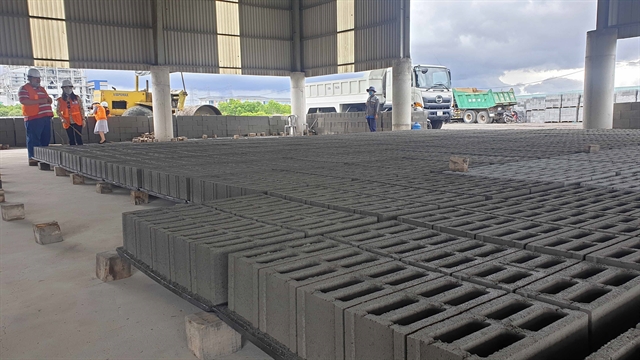The State has approved a programme for using these types of construction materials in Vietnam until 2030.

A factory producing bricks in the southern province of Tra Vinh. — VNA/VNS Photo Thanh Hoa
Speeding up the use of certain types of construction materials will bring many benefits, including reducing CO2 emissions and loss of agricultural land while taking advantage of industrial waste during production, said Phan Hữu Duy Quốc, Deputy Secretary General of the Vietnam Concrete Association (VCA).
This is the type of building material whose production does not use heat for firing and is a material that can replace the role of baked bricks in construction, Quốc said during an online conference in Ha Noi on Sunday.
Lê Văn Kế from the Building Materials Department under the Ministry of Construction said the Government has drawn up many incentive mechanisms and policies to facilitate the use of unburnt construction materials.
Before 2010, however, the volume of such materials in the total volume of construction materials in Việt Nam was low. By 2019, this rate increased to 25-30 per cent, Kế said, adding that due to many different reasons, in recent years, the production and consumption of unburnt construction materials tended to decline.
Other attendants at the event said that the legal framework, mechanisms, policies, standards and regulations for unbaked materials have been completed.
They said previous reports of cracks in masonry using such building materials, which used to be a concern for investors, design consultants, and construction contractors, have also been overcome.
However, unbaked construction materials are only deployed in projects using capital from the State budget and those in which investors are required to use this kind of material. As for non-mandatory projects, investors still tend to avoid using them and are even willing to pay fines to avoid having to use such building materials.
During the conference, Nguyễn Đức Hiệp from the Ha Noi-based Xuân Mai Investment and Construction Corporation outlined some factors that help better the use of building materials in construction projects including the quality of raw materials and regular maintenance of the production lines.
Quốc from the VCA said the quality of projects using unbaked building materials is also influenced by the construction process and other supporting materials so professional support is needed.
The State has approved a programme for unbaked construction materials in Vietnam until 2030. It aims to promote the production and use of these materials to replace fired-clay bricks, effectively using agricultural land resources, reducing greenhouse gas emissions and environmental pollution and making use of waste from industries.
Under the programme, attention will be paid to stepping up the production and use of unbaked building materials to replace about 35-40 per cent of the total baked clay bricks by 2025, and 40-45 per cent by 2030 and ensuring the regulated rate of using such construction materials in works.
It also aims to reduce CO2 emissions by over 2.5 million tonnes per year by 2025 and by over three million tonnes per year by 2030.
Accordingly, attention will be paid to applying modern production technologies and producing large-sized building materials and light products based on the availability of raw material supplies and market demands.
The programme will also promote quality control of unburnt building material products to meet standards and regulations, and the inspection of the implementation of relevant regulations and legal documents to foster the production and use of unburnt building materials. — VNS
Read original article here